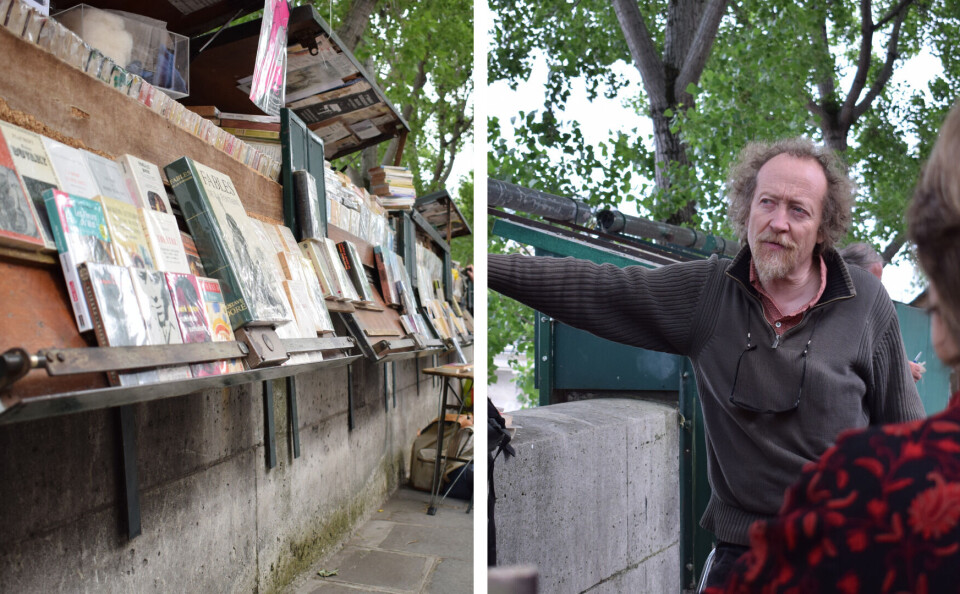-
Occitanie copper phase-out ramps up – how it will affect residents
There are some simple steps you can take to prepare for the switchoff
-
Which cars are stolen the most in France and why?
Perhaps surprisingly, the higher-end vehicles are not the most targeted
-
Several wolf sightings in centre of Frejus, Var
Rules have been relaxed around shooting wolves that threaten livestock
Financially tough but fulfilling: A life selling books by the Seine
Bouquinistes have been a constant presence in Paris for centuries but Covid and changing shopping habits are forcing many to diversify. We visit one to find out more

Jérôme Callais is the face of a Parisian institution dating back more than 450 years.
The man with the receding hairline and ginger goatee is a bouquiniste, one of the instantly recognisable secondhand booksellers plying their trade from famous green boxes along a three-kilometre stretch of the River Seine.
Longest-serving bouquiniste
He has been touting his wares in hot summers, on cold nights and under pouring skies for more than 40 years, making him one of the longest-serving bouquinistes in the business.
As president of the Association culturelle des bouquinistes de Paris, Mr Callais juggles a number of additional tasks alongside his day job.
These range from applying for the trade’s inclusion on Unesco’s Intangible Cultural Heritage list and dealing with the press to collaborating with artists on complementary projects.
‘The freedom is what I like most’
We joined him by the Seine for three hours on a May afternoon to get a taste of what his main role entails.
It was only the second day of the week Mr Callais had opened his boxes, having spent the rest of it travelling to different cities in search of rare books and attending meetings on behalf of his association.
“You open and you close your boxes whenever you want. That freedom is what I like the most about this job,” he said.
The irregular hours and travel come at a price, however. Mr Callais confessed he had not seen much of his wife in two months.
Famous customers
“But it can be very fulfilling. We meet and chat to every type of person,” he said, revealing that recent encounters included conservative politician and former Brexit negotiator Michel Barnier.
Another part of his role entails giving directions to tourists. It is a condition of a bouquiniste’s rent-free arrangement with the Paris mairie that he or she provides these services when asked.
Regular vacancies
It is to the mairie that budding booksellers must apply for a box – the office invites applications every year to fill vacancies brought about by deaths, retirement or simply people wishing to relinquish their spot.
This year, there were 18 openings to join the more than 900 bouquinistes already established.
Read more:Good response to call for new ‘bouquiniste’ booksellers next to Seine
Declining trade
Mr Callais applied for his boxes in the late 1980s, having previously worked as a freelance bass player for Radio France’s orchestra.
However, declining trade due to online shopping and reduced tourist numbers during the gilets jaunes protests and the Covid pandemic mean that he, like so many of his fellow booksellers, is being forced to diversify his offering.
Read more:French bookshops inspire support through lockdown closure
Mr Callais took 20 minutes to explain why, for example, one of his boxes currently contains a clear plastic container half-filled with cotton wool – it is one of 22 installations being ‘exhibited’ by bouquinistes as part of an initiative called De(s)rives #5.
The artists involved hope it will draw in a new audience for their work outside traditional galleries, while the vendors in turn pray the curious onlookers will turn into paying book customers.
Non-book products and ‘bibliotherapy’
As a concession to the financial difficulties bouquinistes face, the mairie has allowed them to sell paintings, posters or tote bags alongside traditional printed books in one of their four boxes.
Mr Callais has also diversified into consultancy, offering ‘bibliotherapy’ services advising customers what to read.
This strand of his business now accounts for as much income as the actual bookselling, he said.
His regular customers certainly seem to value his expertise in the book industry. On the afternoon we visited, he was advising an old friend from Nice on the merits of a particular edition of Louis-Ferdinand Céline’s Castle To Castle.
A further 30 minutes were spent combing through bags of books offered by another regular client. In the end, he took only one book from the piles, offering €25 for it – more than he had made from sales that afternoon.
‘It’s not about the money’
Mr Callais was unwilling to share how much income he makes from sales, except to say that anyone doing it for the money is in the wrong job.
Rather, it is all about the love of books, a passion that shines through in the many signs adorning his boxes.
“Read books so you don’t have to believe everything that’s tweeted,” reads one.
“Reading makes us less dumb. Buy books,” declares another.
Does Mr Callais find time to practise what he preaches?
“I try,” he said.
“I’ve got stacks and stacks of books waiting in line. That’s a big frustration.”
In the meantime, he battles on. To be a bouquiniste has long been a precarious occupation – their imminent demise was being predicted by TV reports as far back as 1974. Things may be harder than ever but Mr Callais, for one, is not giving up just yet.
Related articles:
Shakespeare and Company in Paris supported by online sales
Why Amazon book deliveries will soon cost more in France
Le Petit Prince manuscript travels from US to France for first time
























